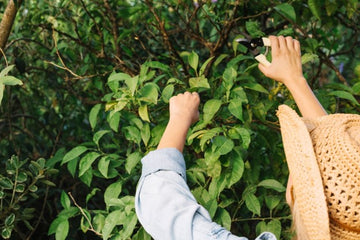Ashwagandha is a medicinal herb that has been used in India for thousands of years and it has many benefits, but some parents are wondering if their children will be able to benefit from its use. So, if you are thinking about using Ashwagandha for kids and teenagers, let’s take a closer look at what it is, where it comes from, what its claims are, and if it is safe to give ashwagandha to kids and teenagers.
How Stress Affects Kids and Teenagers.

Ashwagandha is an adaptogen, which means it helps the body cope with stress more effectively. The best part is that it enhances cognitive performance, improves memory and reduces emotional distress, helping kids and teenagers grow more focused. This positive calming effect on the mind may help also children with ADHD or autism. More research is needed on this field.
Benefits of ashwagandha for Kids and Teenagers.
What's interesting about stress is how it can go on to affect the body in other ways. Stress has been proven to cause your adrenal glands to release cortisol and adrenaline when you're in that stressed state. What this means is that glucose is also released right into the body's bloodstream. But after that initial spike in glucose, the blood sugar level then drops, which can spark cravings for junk food. Clearly eating junk food isn’t going to help maintain a healthy body weight, and so begins a cycle of weight gain.
But it's not just stress and anxiety that Ashwagandha helps with, as a powerful adaptogen it can also help with mood and memory. Empowering emotional equanimity and an enlivened memory will help children in social settings, as well as academically. This can lead to a greater sense of personal well-being and connection with the world all around them. If your child is feeling overwhelmed by their everyday life, it may be time to give them a little bit of help in the form of ashwagandha. Let’s take a closer look at its benefits:
-
Stress and anxiety relief:
One of the most impactful effects it can have is stress and anxiety. The main benefit of Ashwagandha for teens and kids is its ability to enable their bodies to handle physical and emotional stress. Numerous studies indicate that this herb relieves stress excellently. This is of immense help to teenagers and preteens too. Moreover, it fights the effects of stress on the brain and has a potent tranquilizing effect. Ashwagandha is very beneficial if your child has a generalized anxiety disorder (GAD), Social Anxiety Disorder (SAD), Posttraumatic Stress Disorder (PTSD), Obsessive-Compulsive Disorder (OCD), he or she will worry excessively about a variety of things such as grades, family issues, relationships with peers, or performance in sports.
-
Support a balanced immune function:
Growing children tend to fall sick pretty often. So, improving their immunity is something all parents want to do. Since ashwagandha is an adaptogen, boosting immunity is one of the most popular uses of Ashwagandha for teens and kids and adults alike. Research suggests that it does so by increasing the levels of sickness-fighting white blood cells and platelets. It also helps the body develop antibodies, thus improving its response to a health threat. Understanding what Ashwagandha is and where it comes from is only the first step, it’s also important to look into how it may possibly benefit your kids and teenagers.
-
Improves Sleep quality:
Sleep is a critical healthy growth factor for growing children and teenagers. It has a direct impact on daily mental health and intellect development. Ashwagandha root extract is a natural compound with sleep-inducing potential, which can improve sleep quality and sleep onset latency in patients with sleep disorders and insomnia.
-
Enhances memory and mind clarity:
Clinical studies suggest that Ashwagandha may promote attention and behavioral control in children with ADHD by augmenting normal brain development. Research indicates that ashwagandha for teens and kids may do this by inhibiting the activity of the enzyme that breaks down acetylcholine as it does for adults; the neurotransmitter associated with cognition and memory, as well as stimulating the growth of neurons. Another thing you might want to make sure to help your child develop while growing up – is a sharp memory that they can always rely on. Thousands of years ago, Ayurvedic experts discovered that Ashwagandha is an excellent memory enhancer, and now, we’re finding more and more evidence of this. Ashwagandha improves one’s ability to grasp as well as retain information.
-
Helps balance weight:
Researchers have long known that rises in the stress hormone cortisol can lead to weight gain. Every time you're stressed, your adrenal glands release adrenaline and cortisol, and as a result, glucose (your primary source of energy) is released into your bloodstream. All of this is done to give you the energy you need to escape from a risky situation (also known as the fight or flight response). Once the threat has subsided, your adrenaline high wears off and your blood sugar spike drops. This is when cortisol kicks into high gear to replenish your energy supply quickly.
For centuries Indians have used Ashwagandha for teens' weight-related issues, but more research is needed in this field.
-
Restores overall well-being
Ashwagandha operates at the level of the overall body system by helping maintain balance in the substances and essential processes running in the human body. It is used as a restorative tonic for the nervous, endocrine, and immune systems, supporting balance to the adrenal and thyroid function. The result is a reduction of the stress hormone cortisol and lower blood sugar levels. This herb is especially useful in kids who are exhausted from stress, complaining of body aches, and getting sick easily.
Ashwagandha also helps fight Infections. It has been shown to have strong anti-fungal as well as antibacterial properties. This means that it can help with a range of things like fighting off sickness, when the weather changes, healing wounds, and even treating acne that results from bacteria on the skin."
Related links:
- 10 Reasons Why Ashwagandha is the Best Superfood to Enhance Your Well-Being
- The Complete Guide to Adaptogens and How They Can Improve Your Health and Wellbeing
- Benefits of Combining L-Theanine with Ashwagandha
Our Recommendation
LIFE SOURCE combines 6 potent adaptogens including KSM66 Ashwagandha and Red Panax Ginseng to provide a more balanced mood, reduce stress levels, and improve mental health. Maca, Fenugreek, Moringa, and Shilajit are included in the Top 10 Best Adaptogenic Herbs & Combinations because they give you a full set of vitamins, minerals, essential amino acids, and highly beneficial bio-actives that will enhance your quality of life for sure.
Ashwagandha dosage for kids and teenagers.
It is recommended to start with 200-300 mg in the morning and continue this dose for a solid one week before deciding if it is working or not.
For teenagers having a peak of stress or a highly demanding physical exercise, you can add another 200-300mg to the morning routine, or add it in the afternoon for a continued effect during the day. Some people reported that ashwagandha helped them to regulate sleep patterns while others prefer taking ashwagandha 4 hours before bed for better sleep. As this is and adaptogen you need to find the sweet spot that works for you.
However, it's important to note that ashwagandha supplements vary in strength and concentration, so it's essential to follow the specific instructions provided by the manufacturer or healthcare professional.
Following traditional Ayurvedic methods, we suggest taking the product for 2-3 months and then pausing for a few days to give the body rest. Ashwagandha can be taken with or without food.
TIP: You can open the capsules and mix the powder in yogurt or a smoothie.
Safety considerations for teenagers taking Ashwagandha
While ashwagandha appears to have several potential benefits, it's essential to consider safety considerations, especially when it comes to teenagers. As with any supplement, it's important to consult with a healthcare professional before incorporating ashwagandha into a teenager's routine. Here are some key safety considerations to keep in mind:
1. Drug Interactions
Ashwagandha may interact with certain medications, including immunosuppressants, sedatives, and thyroid medications. It's crucial to inform healthcare professionals about any ongoing medications or conditions before considering ashwagandha supplementation.
2. Hormonal Effects
Ashwagandha has been found to have hormonal effects, particularly on thyroid function. Teenagers with underlying thyroid conditions or those taking medications for thyroid disorders should exercise caution and consult with a healthcare professional before using ashwagandha.
3. Allergic Reactions
Although rare, some individuals may experience allergic reactions to ashwagandha. If any signs of an allergic reaction, such as rash, itching, or swelling, occur after taking ashwagandha, it's important to discontinue use and seek medical attention.
How to safely incorporate Ashwagandha into a teenager's routine
To ensure the safe incorporation of ashwagandha into a teenager's routine, consider the following guidelines:
1. Consult with a Healthcare Professional
Before starting any new supplement, it's essential to consult with a healthcare professional who is familiar with the teenager's medical history. They can provide personalized advice and guidance based on individual needs.
2. Choose High-Quality Supplements
Selecting high-quality ashwagandha supplements is crucial to ensure safety and efficacy. Look for supplements that are third-party tested for purity and potency, and also for the extract concentration. Here we recommend only using KSM66 Ashwagandha as it is considered the pinacle of quality and safety of all ashwagandha extracts on teh market.
3. Start with a Low Dose
It's advisable to start with a low dose of ashwagandha and gradually increase as tolerated. This allows the teenager's body to adjust and reduces the risk of potential side effects.
4. Monitor for Adverse Reactions
Regularly monitor for any adverse reactions or changes in symptoms while taking ashwagandha. If any concerns arise, it's important to discontinue use and consult with a healthcare professional.
Ashwagandha Side Effects.
If you're considering Ashwagandha for your kids or teenagers, then you are probably also interested in learning about potential side effects. The good news is that it’s shown to be safe for the majority of people to take and as we can see from above there are numerous positive side effects. Negative side effects however do happen, in rare circumstances.
These are usually attributed to a dose that is too high, which can lead to nausea, digestive upset, vomiting, and diarrhea. These side effects are usually short-lived and not a reason for concern as long as they don’t last a long time.
Ashwagandha has been used for a millennium in the healing science of Ayurveda and can be used in the short term confidently. There are a few health conditions and issues that may prevent a person from taking it, and these are:
- Thyroid disease
- Lupus
- Type 1 diabetes
- Hashimoto's thyroiditis
- Rheumatoid arthritis
- Pregnancy (it can cause premature labor by creating distress for the fetus)
Common side effects of ashwagandha for kids and teenagers.
- Gastrointestinal Disturbances
Some individuals may experience gastrointestinal disturbances, such as stomach upset, diarrhea, or nausea when taking ashwagandha. If these symptoms persist or worsen, it's advisable to stop using the supplement.
- Drowsiness
Ashwagandha is known for its relaxing properties, which may cause drowsiness in some individuals. It's important to avoid activities that require alertness, such as driving or operating machinery if experiencing excessive drowsiness.
- Changes in Blood Sugar Levels
Ashwagandha may have an impact on blood sugar levels. Individuals with diabetes or those taking medications that affect blood sugar should monitor their levels closely and consult with a healthcare professional before using ashwagandha.
Of course, if you have questions regarding its safety, it would be wise to speak to your child's or teen's doctor and get their advice. The common dosage schedule for adults is 300-600mg a day, but there is proven data that Ashwagandha is safe even at 2000mg per day. Kids would be on a smaller dose. It’s also important to note that not every product is made equal and doesn’t always contain high-quality ingredients.
Like any other dietary supplement, it may be avoided during pregnancy and lactation. Patients on medication for insomnia, stress, thyroid or adrenal functions, and diabetes should ask their healthcare provider.
Natural alternatives of ashwagandha for teenagers
While ashwagandha may offer potential benefits, it's essential to explore other natural alternatives that can support teenagers' overall well-being. Here are some additional options to consider:
1. Exercise and Physical Activity
Regular exercise and physical activity have been shown to have numerous benefits for teenagers, including improved mood, reduced stress levels, and better sleep quality. Encourage teenagers to engage in activities they enjoy, such as sports, dancing, or yoga.
2. Healthy Diet
A balanced and nutritious diet plays a vital role in teenagers' overall health and well-being. Encourage the consumption of whole foods, fruits, vegetables, lean proteins, and healthy fats. Avoid processed foods, sugary snacks, and beverages.
3. Stress Management Techniques
Teaching teenagers stress management techniques can help them cope with daily challenges. Techniques such as deep breathing exercises, meditation, journaling, and spending time in nature can promote relaxation and reduce anxiety.
4. Calming tea
Sometimes you only need a simple valerian, chamomile, or lavender tea to find calm and restful sleep. This also works for kids and teenagers. You can add honey and cinnamon to these teas for a more delicious and immune-protection beverage.
Consultation with a healthcare professional before taking Ashwagandha
Before teenagers start taking ashwagandha or any other supplement, it's crucial to consult with a healthcare professional. They can provide personalized advice based on individual circumstances, medical history, and any potential interactions with medications or conditions.
A healthcare professional will assess whether ashwagandha is suitable for the teenager and guide the appropriate dosage and duration of use. They can also monitor for any potential side effects or adverse reactions to ensure the teenager's safety and well-being.
Conclusion
Ashwagandha for teenagers shows promise as a natural remedy, with potential benefits in supporting cognitive function, reducing stress and anxiety, and improving sleep quality. However, it's essential to approach ashwagandha with caution and consult with a healthcare professional to ensure its safety and suitability for individual teenagers.
While ashwagandha can be a valuable addition to a teenager's routine, it's important to prioritize overall health and well-being through a balanced diet, regular exercise, and stress management techniques. By considering a holistic approach, parents can support their teenagers' physical, mental, emotional, and energetic well-being effectively.








